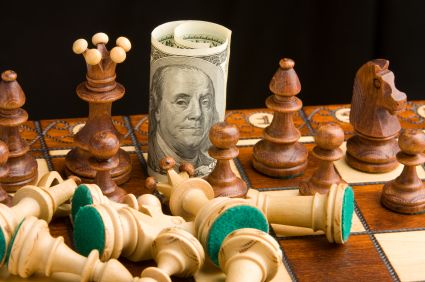
HAVE YOU ever heard the expression “Cash is King”? I heard that expression in business classes and around the office for a while before I really understood what it meant. You’ve probably guessed that it either means that money is king—as I’ve also heard that it makes the world go ‘round—or that aside from other forms of business assets, cash (paper money) is king because it’s the easiest to work with in terms of converting it to other things—equipment, investment accounts, expansion tools, etc.
Although “cash” is often used in every-day conversation to mean the wad of bills you carry around in your wallet, it is also defined by accountants and financial professionals as currency (including coins) on hand, bank account balances, and negotiable money orders and checks.
To summarize, my friends, cash is king because it’s the most flexible form of asset and is the easiest to work with. In general, if you have cash in your possession, you can always do something with it immediately, if the need arises.
Cash is important to businesses and start-ups for several reasons. As you probably don’t have a wealth of financial assets when you’re trying to start a new business, it should be in the interest of every new entrepreneur to stretch those coins and make them count. With cash, you can purchase assets to run your business, pay employees, pay bills and other expenses, etc. The best part about cash is that if you have it, you clearly don’t have to wait for it to come in. That sounded a little confusing, but let me explain…
Imagine that you’ve recently starting a business. You’ve built it from the ground up and have already hired an employee to assist in the growth and development of your new business. You even have a few regular customers who love your product and pay their bills promptly at the end of every month. You’re confident that your customers will keep bringing you their business so toward the beginning of the month, you decided to go out and purchase new computers and printers for yourself and your employee to use for work. You wanted them to last for a while so you bought the top-of-the-line and since you trust that your customers will pay their bills at the end of the month, you weren’t uncomfortable using up the last of your monthly operating budget since all your bills were paid on the first of the month. You did, however, remember to leave enough money in the operating account to pay yourself and your employee on the fifteenth of the month.
When you return to your office—a Class B building that you got a great deal on—you walk in the door to a swampy mess all over the floor. Your tiny bathroom has flooded, leaving your place of business a horrible mess. It will cost quite a bit to get it cleaned up and all the cleaning companies in your area only take cash. What are you going to do now? You can’t afford to get it cleaned up without spending your allocated salaries and you and your employee can’t afford to miss a paycheck.
This scenario could go on and on but the basic concept is clear. If you can, always have available cash resources. Why? Because cash is king. Some businesses don’t extend lines of credit, some don’t accept personal checks, and some still don’t accept wire transfers. Truthfully, most businesses accept all of those things, but charge a premium for processing and it often takes time to process, sometimes several days. The bottom line is that cash is king because everybody accepts it and if you have it, you can use it immediately.
Continuing down that point, cash is king because you can use it immediately. In fact, there are benefits for people who are willing to pay cash. During the handful of financial crises over the past century, cash became the leader in financial transactions because there didn’t have to be any trust behind it. As the markets dipped, “I promise to pay” carried less and less weight. What businesses wanted was cash (paper currency), certified check, or direct transfer. In fact most financial crises of the last century could be credited to people and businesses saying that they could afford to pay back things that they really couldn’t. They didn’t actually have the cash they claimed to back up their purchases. They defaulted on payments and that was that.
As such, cash is king because it’s there when we need it and it keeps us honest. In a world dominated by leverage, payables, receivables, etc., still the only real guarantee to fiscal stability is the possession of cash. If you’re starting a business or growing a new one, always ensure that you have cash resources available.























